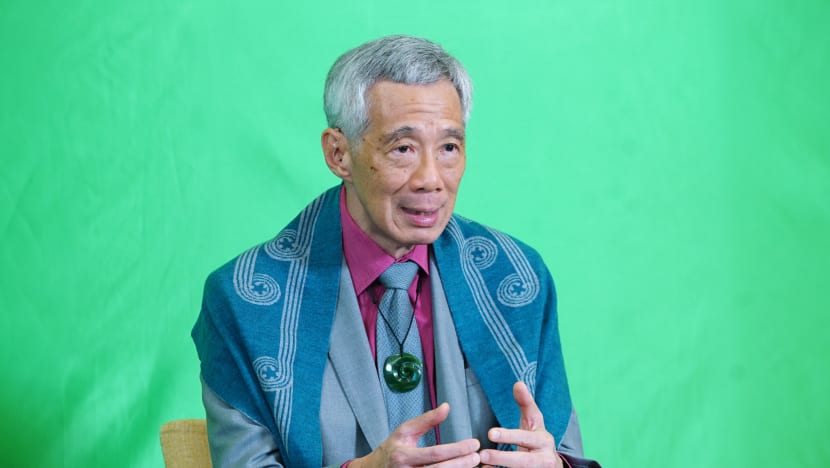
SINGAPORE— As people learn to live with COVID-19, international cooperation is “key” to helping the Asia-Pacific region recover and to building a stronger economy, Singapore’s Prime Minister Lee Hsien Loong told Asia Pacific Economic Cooperation (APEC) leaders on Friday (Nov 12).
He was speaking at the APEC leaders’ meeting, which was held virtually and chaired by New Zealand Prime Minister Jacinda Ardern.
In his speech, Mr Lee praised New Zealand for its excellent leadership as the APEC chair, saying it “galvanised us to cooperate during the pandemic”.
He also highlighted steps that should be taken to help the Asia-Pacific region recover, starting with the progressive reopening of borders.
“Now that our vaccinations are rolling out at a steady pace, this can be done safely,” he said. “Many economies have introduced travel lanes for vaccinated passengers and are keen to expand this.”
He added that Singapore has done so with several APEC economies, including an upcoming one with Malaysia.
However, he said that one complication will be opening up between economies that adopt a “zero COVID” strategy and those that have transitioned to living with the virus.
“Between the two groups of economies, strict border measures will be unavoidable, for some time to come,” he said.
“Nevertheless, we must recognise the importance of reopening our borders in: To rebuilding our economies, supporting our businesses especially in the MICE (meetings, incentives, conferences, and exhibitions) and tourism sectors and to enabling families to reconnect with one another.”
He added that APEC is a “good platform to share ideas and best practices on how to reopen borders safely”.
Mr Lee also encouraged economies to accelerate mutual recognition of digital health certificates and to continue to engage the business community through the APEC Business Advisory Council.
Secondly, APEC should strengthen its supply chain reliability, he said.
“The pandemic has prompted economies to relook at their supply chain resilience including the means to onshore production chains and to strengthen network reliability,” Mr Lee said.
“But in doing so, we should not swing to the extreme. Governments will have an active role intervening to strengthen supply chains.
“But in many cases free markets and globalisation actually produce reliable, diversified and efficient supply networks, more responsively and economically than dirigiste state intervention.”
Economies should also “collectively commit to safeguarding the resilience and openness of supply chains”, Mr Lee added.
“We need to develop strong connectivity links to ensure that trade flows seamlessly,” he said. “To build trust by maintaining the unimpeded flow of goods and services across borders, even during a crisis.”
Mr Lee noted that APEC economies have displayed solidarity and made good progress.
He cited as examples the adoption of the Declaration on Facilitating the Movement of Essential Goods in July last year and the Statement on COVID-19 Vaccine Supply Chains, which was agreed this year.
“Beyond the crisis, our support for multilateral institutions like the WTO (World Trade Organization) and trade liberalisation should complement overt emphasis on supply chain resilience,” he said.
Thirdly, APEC members must deepen regional economic integration.
“APEC members have taken encouraging steps towards its vision of a free trade area of the Asia-Pacific,” he said.
These include agreements such as the Comprehensive and Progressive Agreement for the Trans-Pacific Partnership and the Regional Comprehensive Economic Partnership (RCEP).
The RCEP comprises a “significant number” of APEC members, amounting to 30 per cent of global gross domestic product (GDP), and will come into force on Jan 1.
“We should build on these major schemes to make further progress towards the free trade area of the Asia Pacific,” he said.
Economies must also “look ahead and seize opportunities in new growth areas”, Mr Lee said.
He highlighted the digital economy as one such area, noting that its “economic potential is huge”.
“Annual ICT (information and communications technology) spending in the Asia Pacific will exceed US$1 trillion by 2025,” he said. “In Southeast Asia alone, the internet economy is projected to be over US$300 billion per year.”
Economies must support their businesses and people in making the transition, he added.
“We need to invest in upskilling our workforce and preparing them for the digital age,” he said. “We need to build public digital infrastructure to foster greater interoperability between economies. We need to align our digital rules and standards to facilitate cross border data flows.
“APEC members should enhance cooperation in the digital economy and work towards a regional Digital Economy Agreement (DEA).”
There is a DEA between Singapore and Australia, and a Digital Economy Partnership Agreement (DEPA) among Chile, New Zealand and Singapore.
One way to a regional digital agreement is to expand the existing DEPA, said Mr Lee.
“Alternatively, we can develop a new agreement with a wider membership. These two approaches are not mutually exclusive and can be building blocks towards a larger regional or global digital architecture,” he said.
Mr Lee also highlighted climate change and the green economy as an important area, saying climate change is a “complex issue with no easy solutions”.
There are opportunities for cooperation, such as low-carbon solutions, and new capabilities in areas like green finance and carbon trading services, he added.
“APEC can be an incubator of new ideas, to pioneer innovative solutions and establish common rules and standards in the green economy,” he said.
“Singapore has launched our Green Plan 2030 and is exploring Green Economy Agreements with like-minded partners.
“We are happy to share our experiences and learn from others in order to improve lives, tighten our interdependence and generate prosperity, stability and peace in the Asia Pacific.”
